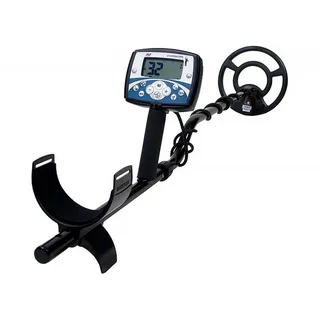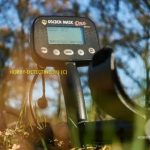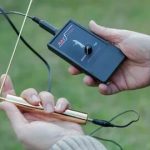Metal Detector Detector: A New Technological Breakthrough
Metal detectors are an important tool used in various settings, from security checkpoints to archaeological excavations. However, the effectiveness of these devices can be compromised by the presence of metal detector detectors (MDDs), which are designed to detect and locate metal detectors. In light of this issue, a new technology has been unveiled – the Metal Detector Detector. This technological breakthrough offers a solution to the problem of MDD interference, promising improved security and efficiency in the use of metal detectors. In this article, we will explore the implications of this new technology and its potential impact on various industries.
The metal detector detector is a new technology that is used to detect and locate metal detectors in a given area. It works by emitting a signal that can be picked up by metal detectors, allowing security personnel to identify and respond to potential security threats. This technology has the potential to enhance security measures in various environments, including airports, public events, and government facilities. It provides an additional layer of protection against concealed weapons and other dangerous items. Overall, the metal detector detector is a significant advancement in security technology that can help to improve public safety and security.
Exploring the Function and Use of a Metal Detector Detector

In the field of security and law enforcement, metal detector detectors play a vital role in ensuring the safety and security of public spaces. These devices are designed to detect and alert operators to the presence of metal objects, such as weapons or contraband, that may have bypassed the primary metal detectors. With advancements in technology, metal detector detectors have become more sophisticated, offering increased accuracy and sensitivity. As a result, they are widely used in airports, government buildings, and other high-security environments to supplement existing security measures and prevent potential threats.
Exploring the function and use of a metal detector involves understanding how the device works to detect metal objects underground or within various materials. Metal detectors operate by emitting electromagnetic fields and detecting changes in those fields caused by nearby metal objects. They are commonly used in security screening, archaeology, and recreational treasure hunting. Understanding the various settings and features of a metal detector can help users effectively locate and identify metal objects. Additionally, learning proper techniques for using a metal detector can improve the chances of successfully finding desired items.
The Importance of Metal Detector Detectors in Security Operations

Metal detector detectors are essential in security operations for several reasons. First and foremost, they allow security personnel to ensure that the metal detectors themselves are functioning properly. By regularly using metal detector detectors, security teams can identify any malfunctions or issues with the metal detectors, allowing for prompt maintenance or replacement.
Additionally, metal detector detectors are crucial for detecting any attempts to bypass security measures. Individuals with malicious intent may try to sneak weapons or other prohibited items past metal detectors by utilizing various techniques, such as concealing metal objects on their person or using substances to shield metal from detection. Metal detector detectors help to uncover these attempts, improving overall security and threat detection capabilities.
Moreover, the use of metal detector detectors can serve as a deterrent to potential wrongdoers. Knowing that metal detector detectors are in use can discourage individuals from attempting to breach security measures, as they understand that their efforts are more likely to be detected and thwarted.
Overall, the importance of metal detector detectors in security operations cannot be overstated. They play a critical role in maintaining the effectiveness of metal detectors, detecting attempts to bypass security measures, and serving as a deterrent to potential threats. By incorporating metal detector detectors into security protocols, organizations can enhance their overall security posture and better protect the safety of their personnel and assets.
Understanding the Technology Behind Metal Detector Detectors

Understanding the technology behind metal detector detectors involves grasping the principles of electromagnetic induction and signal processing. Metal detectors work by generating a magnetic field and then detecting disturbances in the field caused by metal objects. The detectors use coils of wire to create the magnetic field and detect disruptions. Signal processing techniques are employed to analyze and interpret the electromagnetic signals received from the coils, allowing the detectors to distinguish between various types of metal and other materials. Advanced metal detector technology also incorporates features such as frequency modulation, ground balance, and target discrimination to enhance performance and accuracy. Additionally, developments in electronics and materials science have led to the creation of more sophisticated and sensitive metal detector detectors, enabling improved capabilities in security and industrial applications.
The Role of Metal Detector Detectors in Ensuring Public Safety

Metal detector detectors play a crucial role in ensuring public safety by detecting and locating metal detector devices, which could potentially be used for malicious purposes. These devices are used in high-security locations such as airports, government buildings, and public events to prevent the smuggling of weapons or explosives. By effectively identifying and locating metal detector devices, authorities can take necessary actions to ensure the safety of the public and prevent potential threats. Additionally, the use of metal detector detectors helps to deter individuals from attempting to bring prohibited items into secure areas, ultimately contributing to overall public safety.
Choosing the Right Metal Detector Detector for Your Needs
When choosing the right metal detector for your needs, it’s important to consider factors such as the type of terrain you’ll be searching, the specific items you’ll be looking for, and your level of experience. For example, if you’ll be detecting on beaches or in wet conditions, you’ll want to look for a waterproof detector. If you’re searching for small, delicate items, a high-frequency metal detector may be more suitable. Consider your budget as well, as metal detectors can vary greatly in price. Doing thorough research and reading reviews can help you make an informed decision. Additionally, consider factors such as weight, battery life, and extra features like discrimination and ground balancing. Ultimately, the right metal detector for you will depend on your specific needs and preferences.
Innovations in Metal Detector Detector Technology
Innovations in metal detector technology have significantly improved the accuracy and efficiency of metal detection. One major advancement is the use of advanced signal processing algorithms, which allow for better discrimination between metal and non-metal objects. This reduces the number of false alarms and increases the probability of detecting actual threats.
Another innovation is the use of multiple detection technologies, such as electromagnetic induction and ground-penetrating radar, in a single metal detector system. This enables more comprehensive scanning and better detection of hidden or buried metal objects.
Furthermore, the integration of artificial intelligence and machine learning algorithms has enabled metal detectors to continuously improve their performance by learning from previous detections and adapting to different environments and conditions.
Overall, these innovations in metal detector technology have made them more effective and reliable for a wide range of applications, including security screening, archaeological excavations, and industrial inspection.
The Advantages of Using a Metal Detector Detector
1. Metal detectors are highly efficient in locating lost or hidden metal objects, making them a valuable tool in various fields such as archeology, security, and hobbyist treasure hunting.
2. They are portable and easy to use, allowing users to cover large areas and search for metallic items with ease and precision.
3. Metal detectors can help save time and resources in locating buried artifacts, underground pipes, or lost metal items, which can be especially useful in construction projects or recovery operations.
4. They can significantly enhance security measures by detecting weapons, contraband, or other metal objects in public places, airports, and high-security facilities.
5. Many metal detectors come with advanced features such as discrimination settings, depth indicators, and waterproof capabilities, enhancing their versatility and usability in various environments and conditions.
6. The use of metal detectors can lead to the discovery of valuable historical artifacts, precious metals, or hidden treasures, providing both archaeological and recreational value.
7. They are a cost-effective tool for metal detection, offering long-term benefits and savings compared to manual or visual search methods.
How Metal Detector Detectors Are Used in Different Settings
Metal detector detectors are used in a variety of settings, including airports, schools, prisons, and events. In airports, they are used to scan passengers and their belongings for any prohibited items, such as weapons or explosives. In schools, metal detector detectors are used as a safety measure to prevent students from bringing weapons onto campus. In prisons, they are used to search visitors and employees for contraband. Additionally, metal detector detectors are often used at events such as concerts and sports games to ensure the safety of attendees. Overall, metal detector detectors are essential tools for maintaining security in various settings.
Common Misconceptions About Metal Detector Detectors
– Many people believe that all metal detectors are able to detect all types of metals equally. However, this is not true as different metal detectors may be designed to detect specific types of metals and may have varying levels of sensitivity to different metals.
– Another common misconception is that all metal detectors are difficult to use and require extensive technical knowledge. In reality, many modern metal detectors are designed to be user-friendly and can be easily operated even by beginners.
– Some people also mistakenly believe that metal detectors are only able to find metal objects buried underground. While metal detectors are commonly used for this purpose, they can also be used to locate metal objects on the surface or underwater.
– A common myth is that all metal detectors are extremely expensive. While there are certainly high-end models that come with a hefty price tag, there are also many affordable options available on the market for those on a budget.
– Lastly, there is a misconception that metal detectors are only used for treasure hunting or archaeological purposes. In reality, metal detectors have a wide range of applications including security screening, construction, and industrial use.
Training and Certification for Operating Metal Detector Detectors
Training and certification for operating metal detectors involve learning how to properly use the equipment to accurately detect metal objects. This may include understanding the different settings and controls, correctly interpreting signals, and knowing how to adjust for various types of terrain and conditions. Individuals may also be required to demonstrate proficiency in identifying and locating metal objects during training. Certification for operating metal detectors may be necessary for certain industries or job positions to ensure compliance with safety and operational standards.
In conclusion, the unveiling of the Metal Detector Detector represents a significant advancement in security technology. This new device has the potential to greatly enhance security measures by being able to detect and locate any hidden metal detectors. With its advanced capabilities, the Metal Detector Detector promises to revolutionize security protocols in various settings, from airports and public venues to high-security facilities. This innovative technology is a game-changer in the ongoing battle against potential security threats, and its implementation will undoubtedly contribute to safer environments for all. The introduction of the metal detector detector marks a significant step forward in ensuring comprehensive security measures.
See also: price for a metal detector










